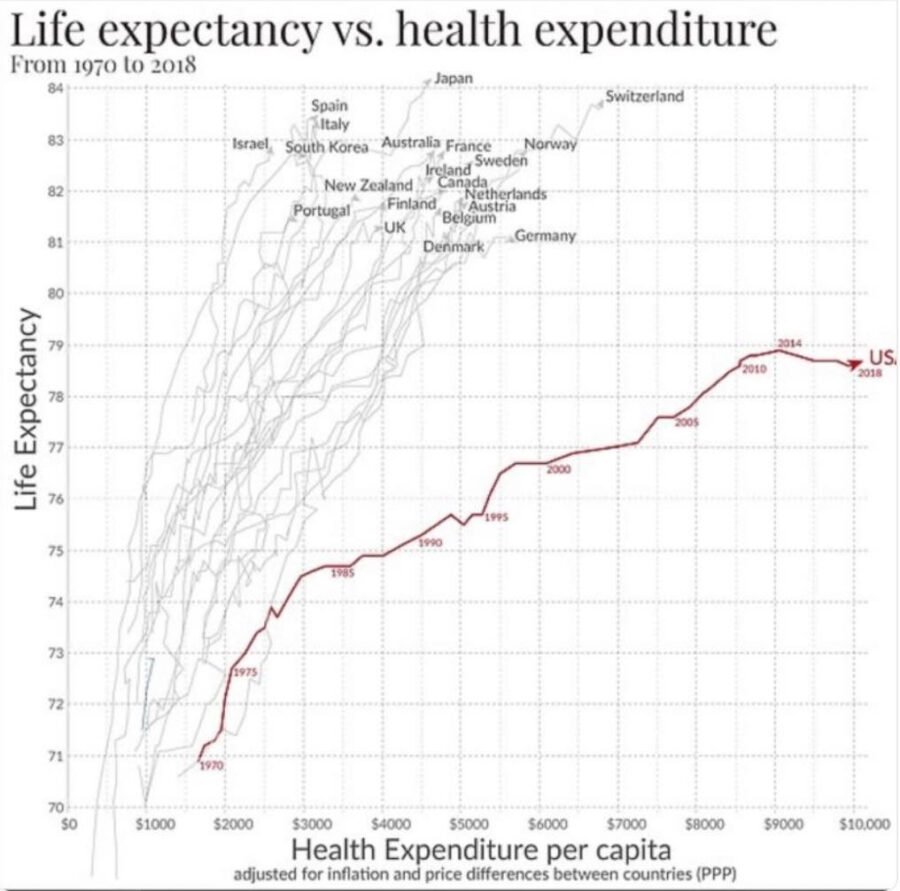Don’t Blame the Health System for the US Health Cost Problem

Collapsing regional economies (particularly in our inner cities, the Deep South and greater Appalachia), an epidemic of obesity, soaring gun violence and escalating mental health issues- these drivers of socially determined demand have flooded hospital emergency departments and surgical suites with casualties. As society has failed many of its most vulnerable citizens, it has also allowed its […]
The future for practicing physicians in a corporate world
The Future of Practicing Physicians in a Corporate World The past two decades have seen a marked decline in physicians’ economic and political power. Private medical practice has withered, and as many as one-third of physicians are now employed by hospitals in the US. More than a hundred thousand more physicians are employed by corporations, health insurers and private equity firms. As the baby boom generation retires, however, physicians will become increasingly scarce, driving up not only their incomes but also their professional power. How will they use their increasing power?
United Healthcare: Anatomy of a Behemoth
United Healthcare Anatomy of a Behemoth On May 25, Jeff Goldsmith posted on Medium a detailed analysis of the business model and strategy of UnitedHealth Group, a $300 billion integrated health insurer. In addition to being the US largest health insurance enterprise, United has greater assets and earnings than Exxon Mobil. It is the also largest employer of physicians in the US, and second only to the British National Health Service in the world. Yet this vast enterprise, which is within reach of being 10% of total US health spending, is poorly understood and appreciated in the industry.
The Reckoning: What Happens to Digital Health After COVID?
The Reckoning: What Happens to Digital Health After COVIDWith Advisory Board President Eric Larsen, Jeff Goldsmith laid out the root causes of the crash in digital health company valuations in 2021-22 and explored how customer needs will determine the size and shape of this promising field. It is wrong to think of digital health in isolation from the existing care system; it is not a new care system, but rather a force multiplier of the core relationships that are at the heart of medicine. What forces will govern the consolidation of the digital heatlh sector?
Trusting relationships are the core of medicine. Can telehealth support them?
After the Crash. After an astonishing run during COVID, digital health and tech stocks withered in a broader collapse of NASDAQ companies in early 2022. What do past industry cycles teach us about how important innovations recover from initial challenges and become essential to our lives? How will health tech recover from the crash and what do innovative companies have to do to power through the downturn?
Digital Health: Avoiding a Second TechLash!
Digital Health: How to Avoid a Second TechLash Digital health offerings have dramatically expanded during COVID, catalyzing tens of billions of venture and private equity funding for new ventures. And yet digital health enthusiasts are making many of the same mistakes that proponents of the electronic health record made two decades ago. How can digital health offerings fit into and improve US healthcare, while improving communication, co-ordination of care and patient/consumer safety.
An American Disgrace
An American Disgrace Jeff Goldsmith reviews Anne Case and Angus Deaton’s “Deaths of Despair” for Health Affairs.
Managed Care 3.0: Rise of the Robots
Managed Care 3.0: Rise of the Robots Much is being made of the potential of artificial intelligence (AI) in healthcare. Little did care providers know that it is already affecting their cash flow! Managed Care 3.0 explores how AI assisted robotic process automation is being used by large and little known healthcare revenue cycle vendors to scrub (and reject) medical claims. Care systems are fighting back with their own AI-assisted systems. Read about this rapidly emerging sector and its risks to care providers.
Health Systems Need to Completely Reassess How They Manage Costs
Health systems Need to Completely Reassess How They Manage Costs. In this Harvard Business Review online posting, Jeff Goldsmith says that health care executives frequently tell him that, in response to recent financial pressures, that “they have done all the easy stuff”. This article explores what they will need to do to actually get control over their costs. If they believe they have picked all the “low hanging fruit”, this article argues that “it is time to get a ladder”.
Do Most Hospitals Benefit from Directly Employing Physicians?
Do Hospitals Benefit from Employing Physicians? Over the last decade, hospitals have employed more than a hundred thousand physicians, many formerly in private practice. Recent evidence suggests that each practice generates direct losses of nearly $200 thousand per year, before considering incremental hospital market share gains. How should hospitals think constructively about the complex challenges surrounding physician employment, and create value both for patients and their physicians? This Harvard Business Review article, with Navigant colleagues Alex Hunter and Amy Strauss, frames and answers these questions.
